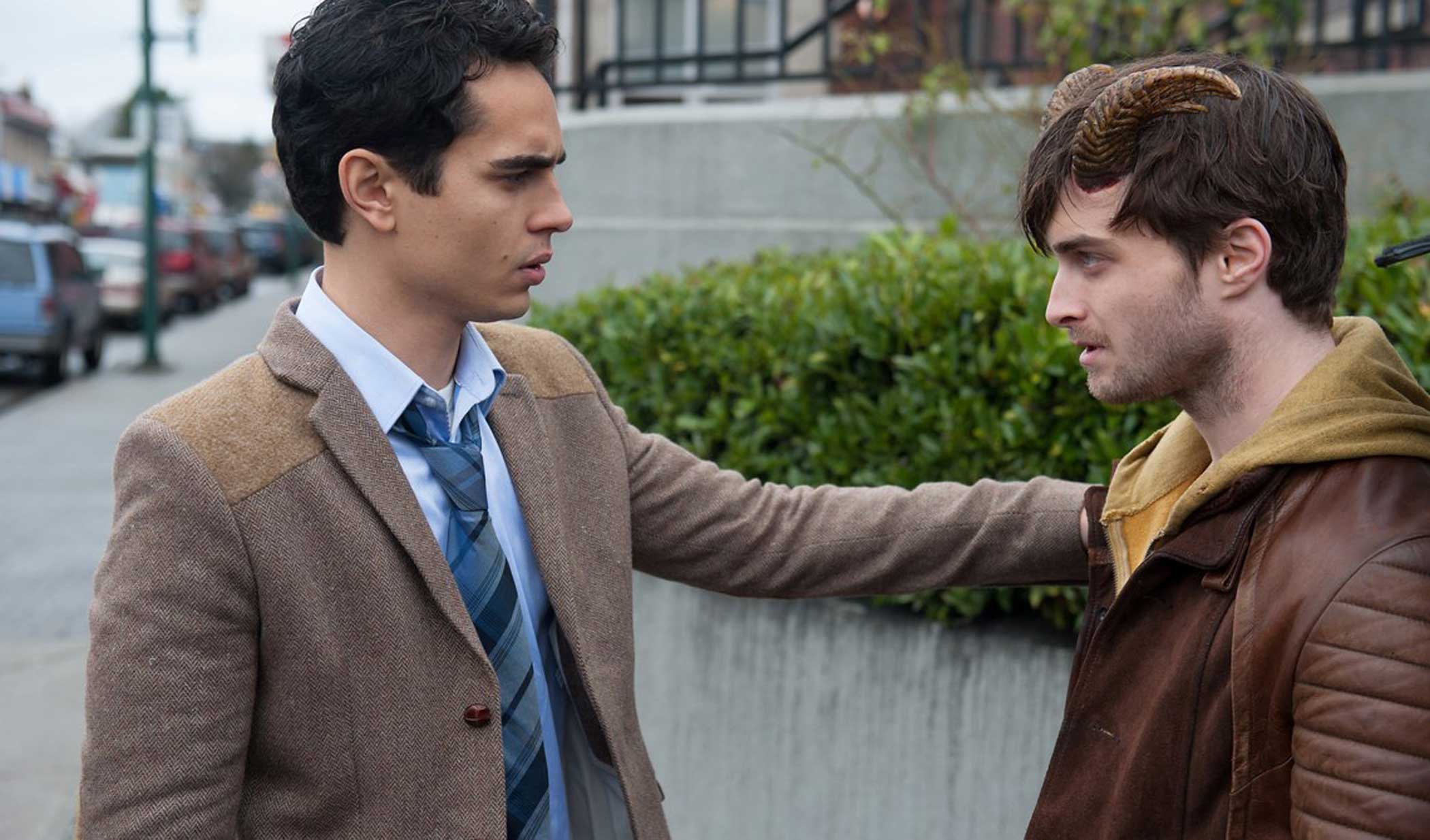
Ignatius Parrish (Daniel Radcliffe) has the power to make people reveal their deepest compulsions: eating all the doughnuts in a box, having sex right now with a coworker, wreaking harm on a balky child. Ig doesn’t really want this gift; it’s a byproduct of the satanic horns that started sprouting from his temples after his one true love Merrin (Juno Temple) was raped and murdered. The police have no evidence to pin the crime on him, but the angry townspeople are convinced he did it. They carry placards that warn, “You Will Burn in Hell,” and the local tabloid paper runs a photo of Ig with the headline “Is This the Devil?” The horns are the objective correlative of prevailing public opinion: Ig is in danger of turning into the awful entity that ignorant people think he is.
Last week Jim Carrey showed up on Saturday Night Live as a red-caped, hornéd Presley — “Helvis.” Now here’s Harry Potter with a Voldemort vibe. Directed by Alexandre Aja and scripted by Keith Bunin from Joe Hill’s 2010 novel, Horns is a horror film with higher ambitions than the usual Halloween movie fare. Actually, it has more on its mind and too much on its plate. The movie takes the concerns of many David Cronenberg chillers about grotesque bodily transformation (Rabid, The Fly, Naked Lunch) and grafts them improbably onto YA romance tales about doomed young people (The Fault in Our Stars, If I Stay). Call it The Fly in Our Stars.
Plus some of the work of Hill’s father, Stephen King. A long flashback of Ig, his brother Terry and their best friend Lou recalls the pubescent taunting and near-tragedies of Stand by Me, the movie made of King’s story “The Body.” A decade or so later, Terry (Joe Anderson) has sunk into alcoholism, perhaps to blur some guilty memory; and Lou (Max Minghella) has become Ig’s public defender. Lou’s fidelity to his defamed pal helps Ig notice a wrinkle in his Horns rulebook: people who believe he’s innocent can’t see them.
Even the movie’s viewers, who can see the horns, know Ig isn’t turning into the Devil. Oh, sure, he’s able to make two burly cops change in a second from mildly bi-curious to lewdly bi-furious. He can summon snakes to do his bidding, and he’s handy with a pitchfork — Lucifer’s favorite farming tool. But Ig is also the most honest, decent fellow in town. He will use these odd abilities only to discover who killed his dear Merrin and to avenge her death. Indeed, if you read the movie’s prominently displayed car license plates (GEN138, 2036LUK, 2017 EXS) as Biblical references (Genesis 13:8, Luke 20:36, Exodus 10:17), you may believe that what compels Ig is not the cunning of Satan but the power of Christ.
Aja, the French director who burst on the international horror scene with the effectively creepy two-girls-in-an-isolated-house thriller High Tension, came to America to helm remakes (The Hills Have Eyes, Mirrors) and sequels (Piranha 3D). Horns aims higher, handing Aja the upmarket London-born actors Radcliffe, Minghella and Temple — all nicely attuned to the cramped gestures and speech patterns of the Pacific Northwest — and the illustrious cinematographer Frederick Elmes, who shot Eraserhead, Blue Velvet and Wild at Heart for David Lynch and, recently, the four-hour drama Olive Kitteridge, to be shown on HBO Nov. 2nd and 3rd.
At nearly two hours, Horns dawdles through the flashback and the politics of rural paranoia. It stumbles in turning Hill’s parable into a vivid movie experience. Anyone could imagine the better, cleaner, more coherent 90-min. film at the core of Horns: the one about the physics of apparent demonic possession. In a scene that references James Franco’s literal disarming in 127 Hours, Ig tries to saw off his head-growths; he bursts into flame as if seared by the fires of Hell; and his army of reptiles slithers magnificently to embrace its prey. (Kudos to Brad McDonald, who in the credits is listed as “Head Animal Wrangler, Snakes.”) The power of Satan may not have engulfed Ig, but it keeps him alive. As he observes, in the movie year’s least necessary line of dialogue: “One thing I’ll say in my favor: I am f—in’ hard to kill.”
The central horror elements are so much snazzier than the others in Horns — those dealing with endless love, coming of age and the small minds of small-town folk — that you wonder why Aja retained them. Maybe the Devil made him do it.
More Must-Reads From TIME
- The 100 Most Influential People of 2024
- The Revolution of Yulia Navalnaya
- 6 Compliments That Land Every Time
- What's the Deal With the Bitcoin Halving?
- If You're Dating Right Now , You're Brave: Column
- The AI That Could Heal a Divided Internet
- Fallout Is a Brilliant Model for the Future of Video Game Adaptations
- Want Weekly Recs on What to Watch, Read, and More? Sign Up for Worth Your Time
Contact us at letters@time.com